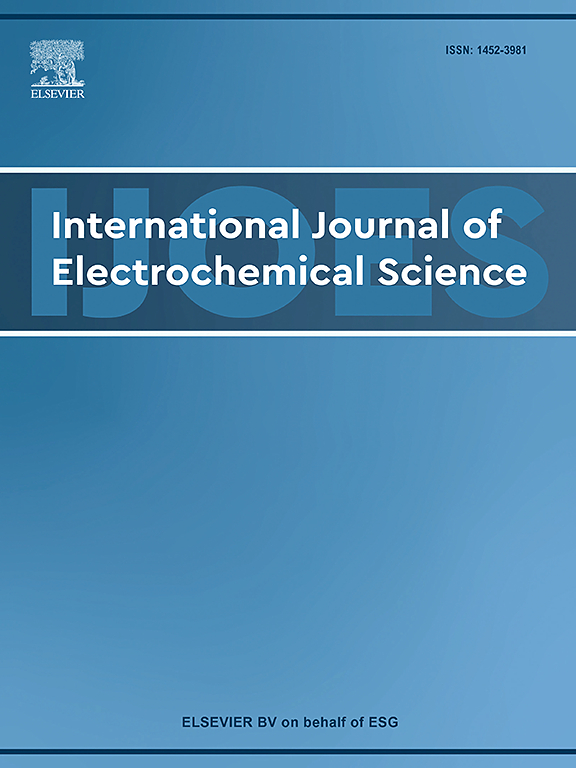碳毡和电生 H2O2 炭黑改性阴极在分化电池中通过过硫酸盐的电化学活化增强 AO7 降解机制
IF 1.3
4区 化学
Q4 ELECTROCHEMISTRY
International Journal of Electrochemical Science
Pub Date : 2024-11-03
DOI:10.1016/j.ijoes.2024.100861
引用次数: 0
摘要
过硫酸盐电化学活化(EA-PS)因其低能耗、环保和良好的回收性能而逐渐受到关注。本文分别采用碳毡(CF)和碳黑改性碳毡(CB-CF)作为分化电池的阴极来降解酸性橙 7(AO7)。本文讨论了不同的实验参数,包括初始 AO7 浓度、初始 pH 值、电流密度和 PS 浓度。EA-PS 过程中的 AO7 降解顺序为 CB-CF>CF,这是由于在 CB-CF 阴极原位生成了 H2O2。在 Cl-、PO43-、HCO3- 和 HA 的存在下探索了 AO7 的降解机制。淬灭实验和 EPR 结果表明,在 CB-CF 体系中,AO7 的降解是 -OH、SO4-和 DET 的综合作用;而在 CF 体系中,AO7 的降解是 -OH、SO4-、1O2 和 DET 的综合作用。这项工作为 EA-PS 工艺提供了一种可行的策略,即在有机污染物降解过程中产生 H2O2。本文章由计算机程序翻译,如有差异,请以英文原文为准。
Enhanced mechanism of AO7 degradation by electrochemical activation of persulfate at carbon felt and electrogenerated H2O2 carbon black-modified cathodes in divided cell
Electrochemical activation of persulfate (EA-PS) is gradually drawing attention owing to its low energy consumption, environmental friendliness and good recycling performance. In this paper, carbon felt (CF) and carbon black modified carbon felt were (CB-CF) employed as cathodes in divided cell to degrade acid orange 7 (AO7), respectively. Different experimental parameters were discussed, including initial AO7 concentration, initial pH, current density and PS concentration. AO7 degradation in EA-PS process is followed the order of CB-CF>CF, owing to the in situ H2O2 generation at CB-CF cathode. The AO7 degradation mechanism was explored in the presence of Cl-, PO43-, HCO3- and HA. Quenching experiment and EPR results revealed that AO7 degradation was the comprehensive effect of •OH, SO4•- and DET in CB-CF system, while in CF system it was the comprehensive effect of •OH, SO4•-, 1O2 and DET. This work provides a feasible strategy for EA-PS process that producing H2O2 in suit for organic contaminants degradation.
求助全文
通过发布文献求助,成功后即可免费获取论文全文。
去求助
来源期刊
CiteScore
3.00
自引率
20.00%
发文量
714
审稿时长
2.6 months
期刊介绍:
International Journal of Electrochemical Science is a peer-reviewed, open access journal that publishes original research articles, short communications as well as review articles in all areas of electrochemistry: Scope - Theoretical and Computational Electrochemistry - Processes on Electrodes - Electroanalytical Chemistry and Sensor Science - Corrosion - Electrochemical Energy Conversion and Storage - Electrochemical Engineering - Coatings - Electrochemical Synthesis - Bioelectrochemistry - Molecular Electrochemistry

 求助内容:
求助内容: 应助结果提醒方式:
应助结果提醒方式:


